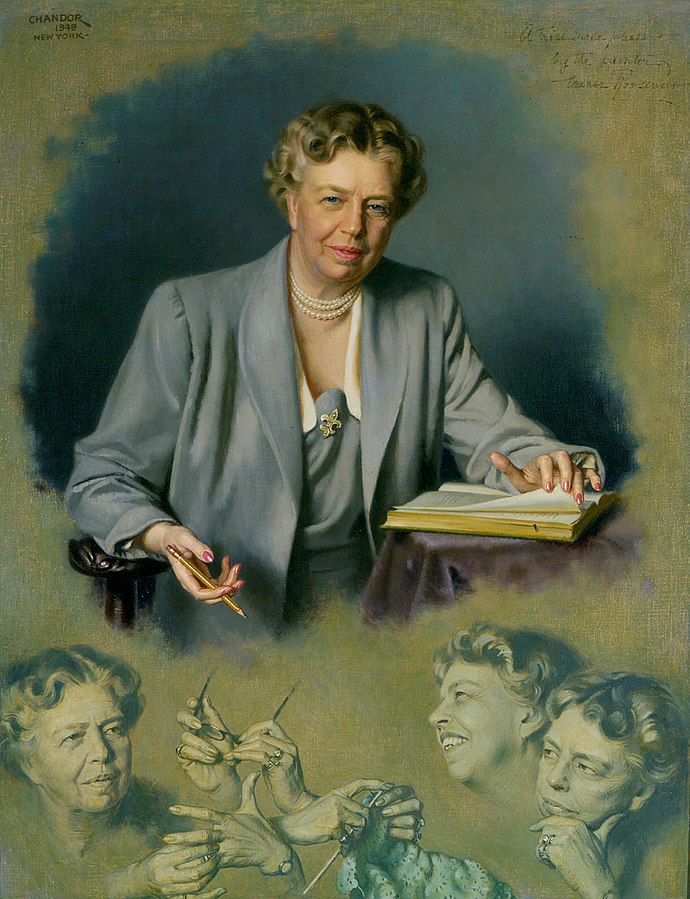 |
| Eleanor Roosevelt Unknown author [Public domain] via Wikimedia |
Eleanor Roosevelt was born October 11, 1884 and died November 7, 1962. She grew up in New York until age 15, where she attended distinguished school in England. There, her fifth cousin Franklin Roosevelt began dating her and they were married on March 17, 1905. Eleanor started her political career in 1911 when Franklin was elected as a senator in New York. Later in Franklin's life he contracted polio and lost the use of his legs and Eleanor, ignoring his mother's insistence that he accept invalidism, nursed him back to health ("Eleanor Roosevelt"). When Franklin was elected as president, Eleanor wrote it was the "end of any personal life of my own" (Roosevelt). She became the most well- known, criticized, and admired First Lady all at the same time. When her husband died April 12, 1945 she recovered and returned to politics within a year. She continued with furthering the causes of humanitarian aid and equal rights until 1962, when she contracted an uncommon form of tuberculosis. She died a week later and was buried in Hyde Park with her husband (Caroli).
Eleanor's sacrifice in humanitarian aid is possibly her most charitable contribution. She visited many people, even if she could sneak in only one visit, like the time on Christmas Island when she visited one boy "about whom the doctor was very worried. At the hospital I made him a promise that he would try to get well if I would try to see his mother on my return" (Roosevelt). She helped people get well from illness no matter the situation. She could have relaxed in the comfort and safety of the White House but instead chose to visit places like Christmas Island to help people like that boy. She also saved lives in the form diplomacy. She was key to creating the Universal Declaration of Human Rights which guaranteed that a person cannot be enslaved, forced into marriage, arbitrary punishment or imprisonment just to name a few (Universal Declaration of Human Rights) (Gardner). Almost every country in the world accepted it, which dramatically improved the quality of life for many.
 |
| Eleanor Roosevelt Portrait Douglas Chandor [Public domain] via Wikimedia |
Eleanor's loyalty to her husband and family was an incredible trait to be admired. Eleanor was amazingly loyal because even after she "discovered that Franklin had fallen in love with her own young, beautiful, and capable personal secretary, Lucy Mercer" (Caroli) she stayed with Franklin, although with severely tested pride and trust. A few years later, Franklin "contracted polio and permanently lost the use of his legs"("Eleanor Roosevelt") and Eleanor, not only forgiving Franklin for what he had done, but also " asserting her will over her mother-in-law (who insisted that Franklin quietly accept invalidism)" nursed him back to health ("Eleanor Roosevelt") . Eleanor not only gave Franklin forgiveness and stayed married to him through an affair, but also battled his mother afterward and nursed him back to health.
Eleanor was an amazing role model to all because she never let anything get in the way of her and what was right, not even personal hardship. I chose her as a hero because she always did what was right, and not what is easy. She was a champion for humanitarian aid during both world wars visiting many soldiers and citizens alike. All in all, she chose compassion over contempt, difficulty over ease, and right over wrong which is exactly what I want to do. I try to have traits like loyalty and compassion and desire to do good, but I sometimes go off track, and she is a good example to use to get back on track.
Page created on 2/9/2017 12:00:00 AM
Last edited 8/23/2024 2:52:26 PM
"Eleanor Roosevelt." Encyclopedia of World Biography, Gale, 1998. Biography in Context, Accessed 24 Jan. 2017.
Black, Alida. "Anna Eleanor Roosevelt." The White House, The United States Government, 31 Dec. 2014
Caroli, Betty Boyd. "Roosevelt, Eleanor." Britannica Biographies (2012): 1. Biography Reference Center. Web. 12 Jan. 2017.
Roosevelt, Eleanor. The Autobiography of Eleanor Roosevelt. New York, Da Capo Press, 1992.
Gardner, Richard N. "Eleanor Roosevelt's Legacy: Human Rights." The New York Times, The New York Times, 9 Dec. 1988
"United Nations Universal Declaration of Human Rights Summary: Youth For Human Rights Video." United Nations Universal Declaration of Human Rights Summary: Youth For Human Rights Video, Youth for Human Rights International
Caroli, Betty Boyd. "Eleanor Roosevelt." Encyclopaedia Britannica, Encyclopaedia Britannica, Inc.15 Dec. 2016
